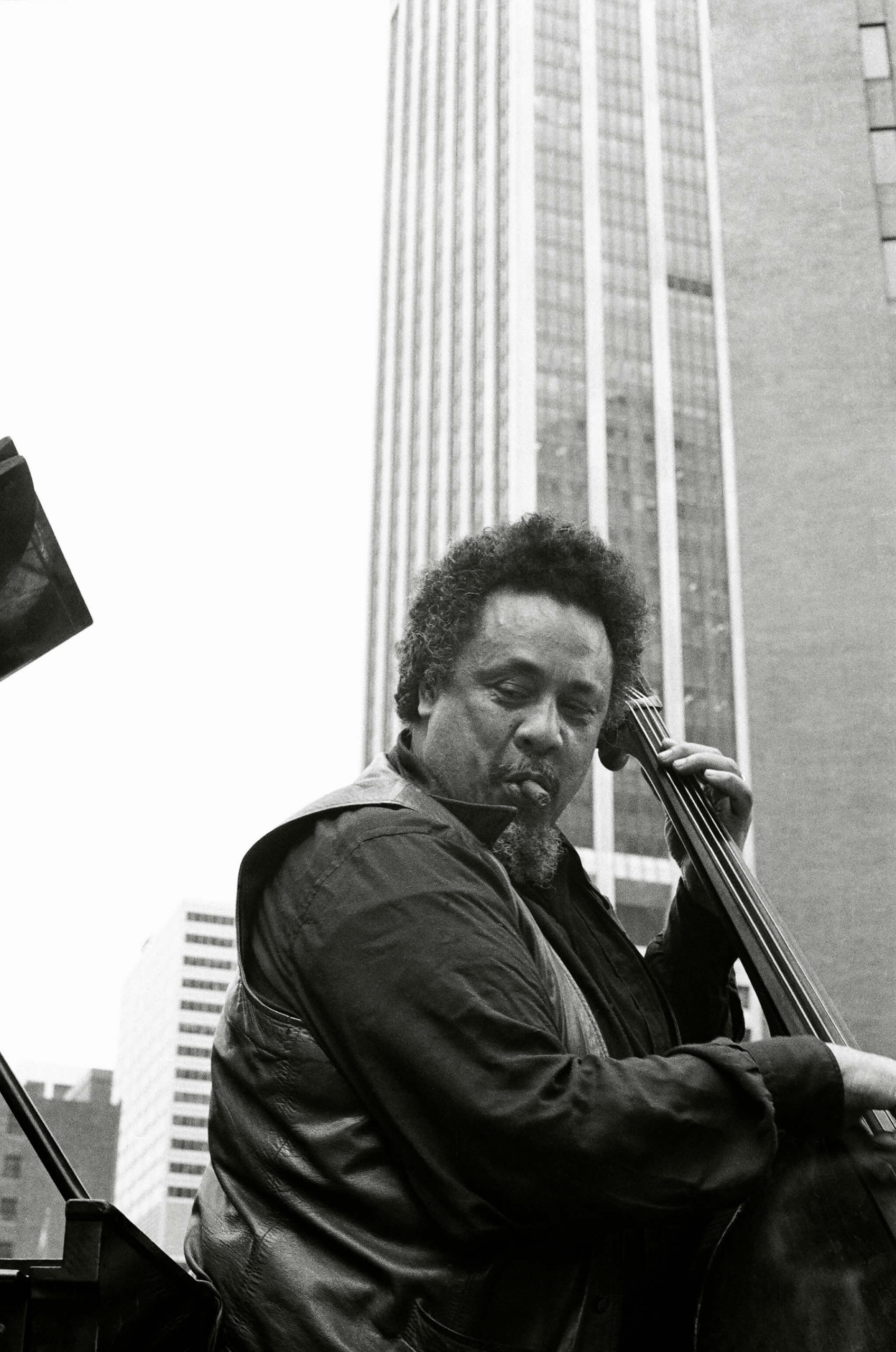Charles Mingus is one of the greatest figures in the history of jazz and modern music. Born 100 years ago this month (April 22) , he’s one of those few musicians who, in the mind of the public and fellow musicians goes by one name: just Mingus, like Miles and Col-trane and Ella and Monk and Duke.
Even rarer, he is the subject of an album by a popular musician, Joni Mitchell’s beauti-ful, evocative Mingus, and like Monk, Kurt Weill, and Nino Rota, he was honored by one of producer Hal Wilner’s all-star tribute albums (Weird Nightmare: Meditations on Mingus, 1992—a frustrating record that sounds like the parable of the blind men describing an el-ephant. It’s also hampered by the use of Harry Partch’s microtonal instruments in many of the arrangements, which makes no musical sense and confuses the whole project.). He’s Mingus, one of the greatest bass players and composers and bandleaders, ever, in jazz. By general consensus, two of his albums, Mingus Ah Um on Columbia and The Black Saint and the Sinner Lady on Impulse are among the finest jazz discs ever made.
His bass playing was both revolutionary and inimitable. He pioneered a new sense of freedom on the instrument, keeping time, yes, but also commenting on what other musi-cians were doing, adding a conversational feeling, something close to dialogue, inside group improvisation. This wasn’t free jazz —Mingus often scorned the avant-gardeists like Or-nette Coleman—it was freedom within the form and structure of the piece the musicians were playing. Maybe Scott LaFaro and Jaco Pastorius have followed Mingus’ example the closest, but there really has been nothing like it since his death in early 1979, from ALS. The great art of it was complemented by his long musical relationship with drummer Dan-ny Richmond. In both studio and live settings the two seem to be playing their own private music, which fits into the overall picture but is like a secret room off to the side that a lis-tener can isolate and explore.
But composing is what I want to get at. Mingus was one of the finest and most im-portant composers in jazz, and I’ve come to think he was in one sense the single greatest and most important. Mingus made jazz composing modern, and he made it beholden to no other criteria than that of his chosen idiom.
Monk and Ellington were also great composers, geniuses really. Monk was like Webern, reconfiguring song form into spare but indestructible Buckyballs of music, their structural logic an infinite puzzle to work and rework. Ellington rethought popular songs dance and and turned them into vessels for uncanny melodies, colors, timbres, and deep and complex human feeling. In a way the two are respective analogues of the Classical and Romantic eras in classical music.
They also never left the idea of songs behind. Not Monk, certainly, but Ellington’s long-er form suites and ballets were extended collections of the forms he worked with for dec-ades. This is where we get into comparisons between genres and their relative status. El-lington especially has been elevated as a modern classical composer, someone to be thought of on par with Beethoven. And that’s not wrong, he is as great and important an artist, but it also misses the point: comparing jazz to classical music is an exercise in social and cultural prestige, it misses the fundamental point of the music. Let jazz be jazz.
The culture business in America is still more beholden to European criteria than it seems willing to admit, and the idea that Europe is the center of status and prestige for art music weighs down the arts in this country nearly as much as it did in the 19th century, despite Charles Ives and despite Ellington and Mingus (who is very much a Black, jazz Ives). Ellington never has to be thought of as good as Beethoven, jazz never has to be thought of as good as classical music, because Ellington and jazz are entirely different things, technically sophisticated and aesthetically profound on their own terms, and at as high a level as Beethoven. As I’ve written in these pages, a song is harder to write than a sonata, so when you listen to “In a Sentimental Mood” or “Epistrophy,” you can think, man, Beethoven and Stravinsky are as good as this stuff.
Another extraordinary song is “Goodbye Porkpie Hat,” and also “Orange Was the Color of Her Dress, Then Blue Silk,” and also “Gunslinging Bird” and “Better Get Hit in Your Soul.” Mingus was a brilliant song writer, and a brilliant composer who took jazz out of basic song form and made music that is as deep jazz as jazz gets while also developing entirely new structures, especially the discontinuous episodes of “Fables of Faubus.” Modern composers who work in discontinuous forms, from Xenakis to Zorn, are hailed for their sophistication. Mingus did the exact same thing and kept it jazz.
Except he did something more. “Fables of Faubus” isn’t just a series of sections laid end to end to make something larger, it is a musical and political indictment of segregation of Arkansas Governor Orval Faubus. And, like other great Mingus works, including “Oh Lord Don’t Let Them Drop the Atomic Bomb on Me,” it’s got lyrics:
Oh, Lord, don’t let ’em shoot us!
Oh, Lord, don’t let ’em stab us!
Oh, Lord, no more swastikas!
Oh, Lord, no more Ku Klux Klan!
Name me someone who’s ridiculous, Dannie.
Governor Faubus!
Why is he so sick and ridiculous?
He won’t permit integrated schools.
Then he’s a fool! Boo! Nazi fascist supremists!
Boo! Ku Klux Klan (with your Jim Crow plan).
Name me a handful that’s ridiculous, Dannie Richmond.
Faubus, Rockefeller, Eisenhower.
Why are they so sick and ridiculous?
Two, four, six, eight:
They brainwash and teach you hate.
H-E-L-L-O, Hello.
The lyrics clown Faubus, and so does the music. For Mingus Ah Um, Columbia told Mingus he couldn’t record the lyrics, but the instrumental sound of this, the mockery that comes from within confident wisdom and humor, is unmistakable. It’s great protest music that is also great music—unlike the contemporary trend of giving a piece of music a title that is about a political idea then leaving all the political content out of the music itself—and it’s also great modern compositional thinking.
That’s the importance of Mingus, making unmistakable jazz—extraordinary jazz—and creating his own modern techniques that opened up compositional possibilities that go be-yond AABA song form. He also is one the rare musicians, like Mahler, who could capture irony in music, not just in titles like “All The Things You Could Be Right Now if Sigmund Freud’s Wife Was Your Mother,” but in the actual notes themselves. And of course, he nev-er left the blues behind. That Mingus sound, everybody together but expressively loose and gutty, is as unmistakable as Ellington’s, and the sextet he brought on tour in 1964 was one of the greatest small jazz ensembles there has ever been.
We’re fortunate to have numerous recordings from that tour, and along with the Min-gus studio discography, every few years it seems another major archival live recording comes out. This year, for Record Story Day on April 23, Resonance records is putting out The Lost Album at Ronnie Scott’s a three-LP set of a 1972 gig Mingus led at Ronnie Scott’s in London. Mingus was playing as strong as ever, his physical deterioration had yet to appear, and despite his own personal anger he always brought exuberance and joy to the band-stand. And his musical legacy lives, literally, on Monday nights at The Django, where the Mingus Big Band has returned after pandemic hiatus. Mingus lives.
Author
-

George Grella wrote the book on Miles Davis’ Bitches Brew. He write other stuff too. killyridols.substack.com/
View all posts
George Grella wrote the book on Miles Davis’ Bitches Brew. He write other stuff too. killyridols.substack.com/










